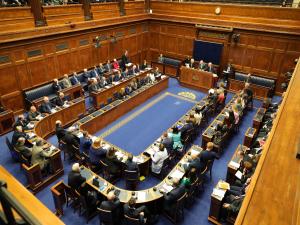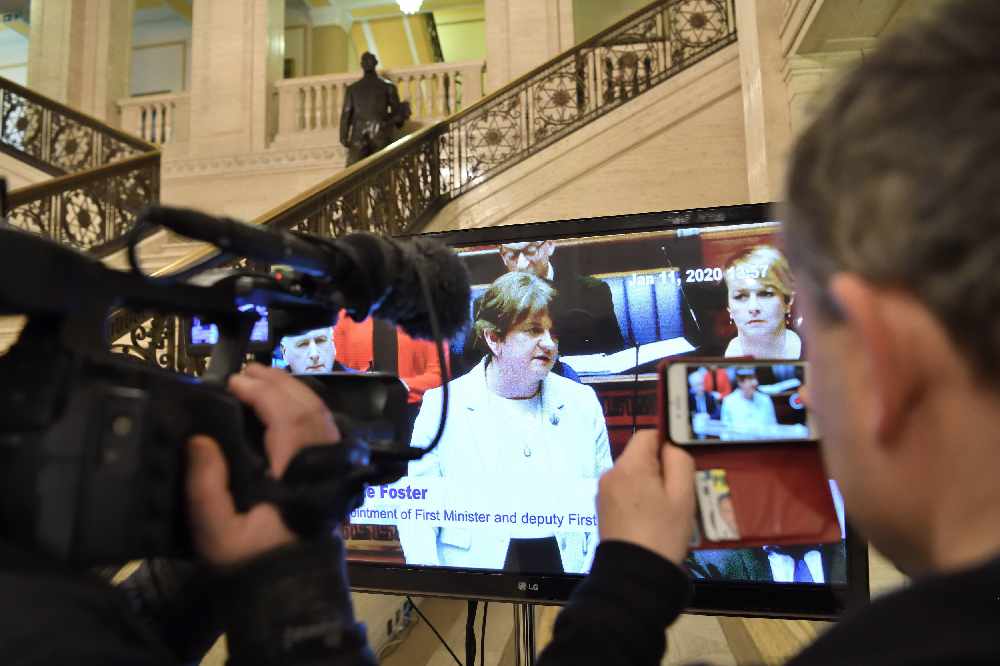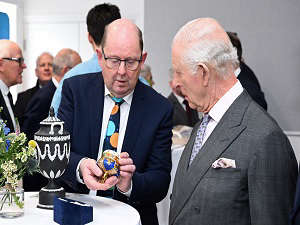
By David Young, Cate McCurry and Rebecca Black, PA
Stormont's first and deputy first ministers have been appointed after powersharing returned to Northern Ireland.
DUP leader Arlene Foster resumes the first minister role she lost when the last coalition executive collapsed in 2017 while Sinn Fein's Stormont leader Michelle O'Neill has become deputy first minister.
Despite the titles, both offices hold equal status in the ministerial executive.
Ms Foster said she was "deeply humbled". The DUP leader said there was plenty of blame to go around for the three-year powersharing impasse but she insisted it was now time to look to the future.
Significantly, given one of the key disputes at the heart of political crisis, Ms Foster made reference to an Irish language phrase in a speech that stressed the need to work together going forward.

"When I visited Our Lady's Grammar in Newry, the pupils gave me a lovely picture as a gift," she said.
"It has hung in my office upstairs ever since, just above my shoulder. In Irish, it states: 'Together, we are strong'.
"We have many differences. Michelle's narrative of the past 40 years could not be more different to mine.
"I'm not sure we will ever agree on much about the past, but we can agree there was too much suffering, and that we cannot allow society to drift backwards and allow division to grow.
"Northern Ireland is succeeding in many ways. It's time for Stormont to move forward and show that 'together we are stronger' for the benefit of everyone."
Ms O'Neill said it was a "defining moment" for the region.
"After three years without functioning institutions with the five parties forming the new Executive, it is my hope that we do so united in our determination to deliver a stable power-sharing coalition that works on the basis of openness, transparency and accountability, and in good faith and with no surprises," she said.
"I am honoured to follow in the footsteps of my dear friend and comrade Martin Mc Guinness taking up the position of deputy first minister, and as joint head of Government I too pledge to follow the example of Martin by actively promoting reconciliation, and building bridges we can all cross to end sectarianism and bigotry."
All five of the main parties will form the region's new powersharing executive.
Moments before business resumed at Parliament Buildings at lunchtime, the Ulster Unionist Party confirmed it will take up a ministry in the coalition executive while the Alliance Party said it had accepted an invite to fill the justice ministry.
They will join the DUP, Sinn Fein and SDLP in the administration. It marks a significant development as the last executive prior to Stormont's collapse in 2017 did not include the three smaller parties.
After the landmark deal to restore devolution, the Assembly has returned three years on from the acrimonious collapse of the institutions.
Powersharing returned after the DUP and Sinn Fein, the region's two largest parties, agreed to re-enter a mandatory coalition ministerial executive.
They have both signed up to a deal, tabled by the UK and Irish governments, that offered compromise resolutions to a range of long-standing disputes on issues such as the Irish language.
The endorsement of the two parties was essential for the formation of an executive, as peace process structures mean an administration can only function if it includes the largest unionist party and largest nationalist party.
Sinn Fein's Alex Maskey had been elected as the new speaker of the Assembly.
The rest of the new ministerial executive will be elected later on Saturday afternoon.
The plenary session is scheduled to last for three-and-a-half hours.
The "New Decade, New Approach" deal will also be accompanied by what the UK Government has promised will be a major investment package.
Government funding is set to help tackle a host of acute problems facing a public sector that has been floundering amid the governance vacuum.
One of the most high-profile of those is an industrial dispute in the health service that has seen nurses take strike action on three occasions in the last month.
Under the terms of the deal, the new executive will also take action to reduce spiralling hospital waiting lists; extend mitigation payments for benefit claimants hit by welfare reforms; increase the number of police officers on the beat; and resolve an industrial dispute involving teachers.
The last DUP/Sinn Fein-led coalition government collapsed in January 2017 over a row about a botched green energy scheme.
That row subsequently widened to take in more traditional wrangles on matters such as the Irish language and the thorny legacy of the Troubles.


 Forensic accountants to examine projected NI Water overspend, Kimmins announces
Forensic accountants to examine projected NI Water overspend, Kimmins announces
 Nine Northern Ireland schools targeted with threatening email thought to be hoax
Nine Northern Ireland schools targeted with threatening email thought to be hoax
 Exhumed remains not those of Disappeared victim Joe Lynskey
Exhumed remains not those of Disappeared victim Joe Lynskey
 King and Queen conclude three-day visit to Northern Ireland
King and Queen conclude three-day visit to Northern Ireland
 Conor McGregor seeks to introduce new evidence in civil rape appeal case
Conor McGregor seeks to introduce new evidence in civil rape appeal case